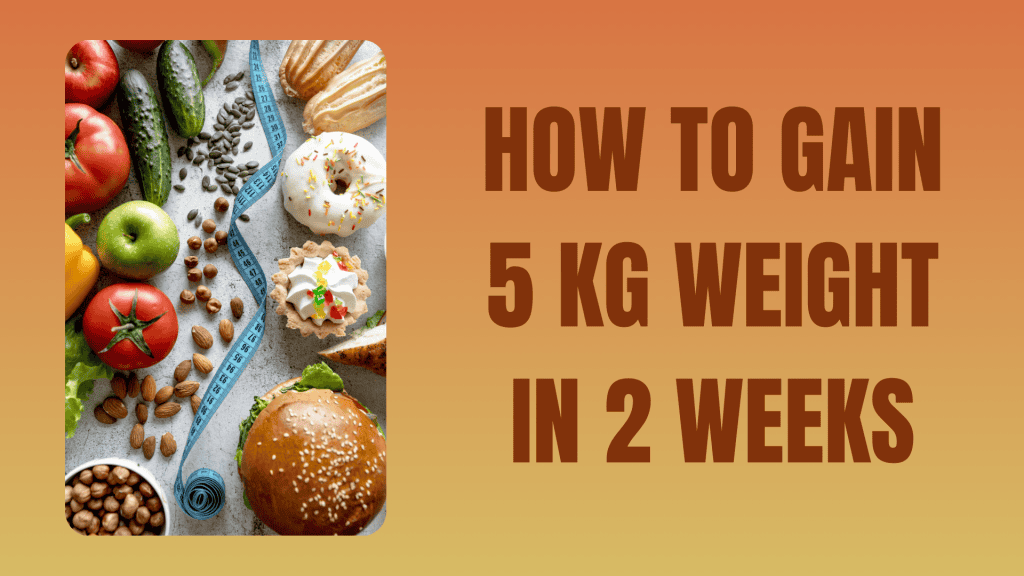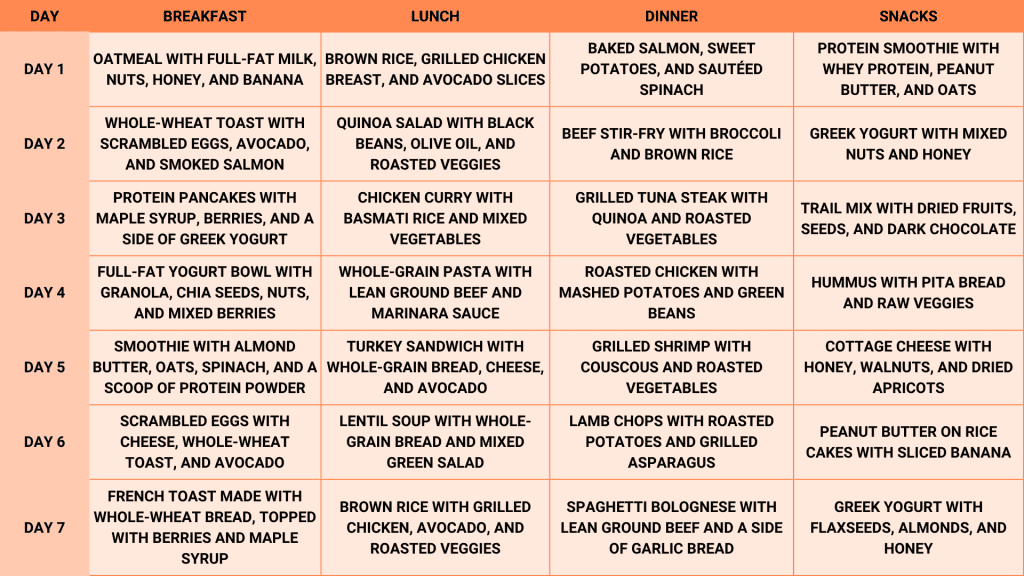To gain 5 kg weight in 2 weeks, one can focus on increasing their calorie intake, consume a nutrient-rich diet, and practice muscle-building exercise. The most efficient way to gain weight is taking more calories than you are spending by combining healthy fats, protein-rich foods, and complex carbohydrates which will give your body enough fuel for growth. One should indulge in regular strength training as it helps in building muscle mass and overall body composition. Continue reading to find a reasonable answer for your doubt of how can I gain 5 kg in 2 weeks?
Can you gain 5 Kg in 2 weeks?
Yes, you can gain 5 kg within 2 weeks, but an average person has to focus on diet and workout seriously to achieve that. You will have to consume a caloric surplus; in other words, eat much more calories than your body burns in a day to gain weight this fast. This usually can range from 500–1000 extra calories per day; however, if you need to gain 5 kg weight in 2 weeks, you must require an even more enormous surplus. However, this will likely be the case where the additional poundage gained may not be pure muscle since gaining pure muscle at such a rate without substantial resistance training and genetic predisposition is hard to achieve.
More healthy fats include nuts, avocados, and oils, with complex carbohydrates, whole grains, and starchy vegetables to keep the energy flowing for workouts and recovery. Moreover, lean meats, eggs, fish, and legumes require protein rich foods for muscle growth. Even if it can be done relatively fast, your body needs time to adapt to absorb nutrients properly without any digestive distress and other future health problems. Therefore, when asking, “can I gain 5 Kg in 2 weeks?” it is advisable to seek the advice of a medical professional or dietitian when planning your exclusive, long-term diet.
10 Ways on How to gain 5 Kg weight in 2 weeks?
If you want to gain 5 kg weight in 2 weeks, it’s all about ensuring you eat more calories than you burn. However, it’s not about eating more; it’s about eating more nutrient-dense, calorie-rich food, with some muscle-building exercises to see the best. In other words, the trick is a smart approach focusing on nutrition and exercise. One of the most effective ways to master how to gain 5 kg weight in 2 weeks is to focus on nutrient-dense meals. Therefore, here are ten proven strategies that will help you achieve safe and rapid weight gain:
- Eat Larger Portions
- Frequent Snacking
- High-Protein Meals
- Healthy Fats
- Complex Carbohydrates
- Calorie-Dense Drinks
- Meal Prepping
- Strength Training
- Progressive Overload
- Rest and Recovery
1. Eat Larger Portions
To gain weight, one will focus more on caloric surplus when you consumes more calories than your body needs. In simple words, it works through larger portions. You want to add proteins, carbs, and healthy fats to your meals. For example, instead of only one chicken breast on your plate for dinner, add a second one, add some more rice handfuls, and include some avocado to boost calories. It’s easy but effective—if you eat bigger portions of everything at every meal, you’ll be closer to your calorie goals faster than you would otherwise.
2. Frequent Snacking
Snacking throughout the day is another good way to spike your calorie counts quickly, although calorie-dense snacks like nuts, dried fruits, and yogurt are crucial as they pack many calories into small portions. For instance, a handful of almonds can add about 160 calories to your day, though it will hardly show in snacking. You can also have a banana with peanut butter. The calories will be complemented by healthy fats and proteins that will help you gain weight.
3. High-Protein Meals
Since it is the building block of muscle and gaining weight, protein helps recover from strength training, thus enhancing the growth of muscles. You can include chicken, eggs, fish, and beans in every meal. For instance, take chicken: 100 grams of chicken yields about 31 grams of protein and has relatively low fat so it can complement high-calorie sides such as potatoes or rice. Therefore, high protein intake will ensure that you are gaining a healthy weight and are focused on the muscle part.
4. Healthy Fats
Avocados, olive oil, nuts, and seeds are rich in monounsaturated and polyunsaturated fats, which are great for your heart and overall health. Moreover, fats are incredibly calorie-dense, offering 9 calories per gram compared to 4 calories from carbs or protein. So, adding a tablespoon of olive oil to your meals (120 calories!) or snacking on an avocado (around 234 calories) will quickly add to your calorie intake.
5. Complex Carbohydrates
For sustained energy and additional calories, include complex carbohydrates like whole grains, quinoa, sweet potatoes, and brown rice. They have many calories but also give sustained energy for the body, which is required when strength training. For example, one cup of brown rice contains approximately 215 calories and is rich in fiber and nutrients. Quinoa is also rich in protein and carbs; therefore, it is good for the Keto diet to gain weight.
6. Calorie-Dense Drinks
That’s a lot of food, and that can be overwhelming. But drinking your calories, for one thing, will surely fall on the easy end. You aren’t consuming, for instance, a full-fat milk drink, a smoothie, or maybe some homemade protein shakes when you’re making yourself feel so full. You can get nearly 500 calories just by having milk, a banana, peanut butter for weight gain, and a yogurt smoothie. Likewise, drinking a glass of full-fat milk with 149 calories in one cup between meals can easily find its way into your diet.
7. Meal Prepping
Meal prep refers to planning a few meals and should prepare you to eat at all times. Prepare high-calorie, healthy, nutrient-rich meals beforehand to never reach for something to eat when hungry. In other words, it allows you to rely on something other than low-calorie foods when in a hurry. Cook a large batch of calorie-dense meals such as pasta, casseroles, or stews and store them to ensure that you are always prepared to go.
8. Strength Training
And if you are trying to put on muscle mass, surely you won’t want all those extra calories tucked away as fat, right? Strength training lets you ensure the weight you gain comes from lean, healthy muscle mass. Emphasize compound exercises like squats, deadlifts, and bench presses that recruit numerous muscle cells and stimulate growth. And you’ll lose fewer gains if you can achieve 3-4 weekly weightlifting sessions.
9. Progressive Overload
To get the best out of your work, you must practice progressive overload, which means lifting heavier or increasing the number of reps weekly. In simple terms, constantly challenging your muscles makes them grow and adapt to become faster muscle gains. For example, if you start squatting with 20 kg, go for it and try increasing it to 25 kg the next week. So, you will achieve greater muscle growth through healthy weight gain by increasing your weight.
10. Rest and Recovery
Another important thing that you should not neglect is rest and sleep. Muscles must first take time to recover and build up after strength training, which means adequate sleep (7-9 hours at night) and rest between workouts are necessary. Moreover, recovery can also prevent overtraining that makes you slow down. To achieve your goal of how to gain 5 kg weight in 2 weeks, it’s important to focus on both diet and exercise.
Foods to eat when gaining 5 Kg weight in 2 weeks
Concentrate on calorie-rich and nutrient-dense foods to gain 5 kg weight in 2 weeks. Calorie-rich foods will naturally contribute to achieving your target since they pack a lot of energy without requiring one to consume huge portions. However, nutrient-rich foods should also contribute the same amounts to ensure health benefits while piling on pounds. That is to say, you would love to consume some more calories but only from somewhere. You’d prefer those extra calories to come from healthy foods rather than junk foods. What are the best foods to add?
1. Nuts and seeds
One of the calorie-richest healthy foods concentrations is nuts and seeds. For instance, almonds and walnuts, etc, and seeds as samples, such as chia or flaxseeds, contain rich monounsaturated and polyunsaturated fats. Nuts and seeds are among some of the best foods for dieting to gain weight because of how much they can add healthy fats and are calorie-dense. Also, these fats contain more than double the calories of proteins and carbohydrates, so they will help you accelerate your calorie intake. For instance, a 100-gram serving of almonds contains around 579 calories, so it will be a great snack for those looking to gain weight fast.
2. Guacamole
Avocados are yet another excellent choice when trying to gain weight due to their healthy fats, which include much-monounsaturated fats known to be heart-friendly. What makes avocados stand out is that apart from their high-calorie count, each avocado has approximately 234 calories and contains key nutrients, including potassium, fiber, and vitamins. Therefore, including avocados in your diet by adding them on top of toast or in a salad or spreading them could be very calorie-rich for your meals, but stay healthy.
3. Whole Grains
If you want to add pounds, a good source of sustained energy is required, and a whole grain is the best. The powerhouse foods in complex carbohydrates are quinoa, oats, brown rice, and whole-wheat bread. It is what your body would love to burn for fuel, and calories don’t just get consumed but are accompanied by loads of fiber, vitamins, and minerals. For example, one cup of cooked quinoa provides about 222 calories and all nine essential amino acids vital for muscle growth. Similarly, oats and brown rice are excellent for providing the energy that will sustain you throughout the day and add to your calorie count.
4. Lean Meats and Fish
Proportionately, protein is needed in the building and repair of muscles, especially during the time one may need to gain weight healthily. Chicken and turkey lean meats are replete with good quality protein, while fatty fish such as salmon have an added benefit of omega-3 fatty acids, the very best you can consume for the heart. For instance, there are 165 calories and 31 grams of proteins in 100 grams of chicken breast. Thus, it is perfectly acceptable to add for weight gain. Additionally, salmon is not only a source of protein but also contributes healthy fats when taken in a 100-gram amount that holds about 208 calories.
5. Milk products
However, fats are sometimes necessary since calorie-rich food items inherently have full-fat dairy products. Whole milk and cheese are very high calorie foods, which are significant for the development of muscles and weight gain. One cup of whole milk has 149 calories; one slice of cheddar has approximately 113 calories. Such dairy products are easy to include in your food or snacks: a glass of milk, fruit with yogurt, or cheese on your sandwich. To conclude, these foods are readily available, calorie-dense foods loaded with nutrients that support your goal of gaining weight.
6. Starchy Vegetables
Starchy vegetables include sweet potatoes, regular potatoes, and corn, which are great because they’re high in carbohydrates, which your body extensively uses as the first source of energy. Additionally, these veggies consist of good fiber and are nutritionally important, supporting your total well-being. For instance, a medium-sized sweet potato consists of around 103 calories, making it an excellent source of adding calorie content without losing nutritional worth. In addition to that, starchy vegetables are versatile and can be prepared easily while being served in many dishes, roasted, mashed, or included in soups.
Many people ask, “How to gain 10 kg in 1 month?” With the right balance of nutrition and rest, this goal is achievable.
Diet Plan to gain 5 Kg in 2 weeks
A well-planned diet is essential to know how to gain 5 Kg weight in 2 weeks. You should focus on eating calorie-dense, nutrient-rich meals frequently throughout the day. Now that we’ve covered the basics, let’s explore how to gain 5 kg in 7 days with a personalized meal plan designed using a daily calorie intake calculator. Below is a 2-week diet plan:
Day 1
- Breakfast: Oatmeal with full-fat milk, nuts, honey, and banana
- Lunch: Brown rice, grilled chicken breast, and avocado slices
- Dinner: Baked salmon, sweet potatoes, and sautéed spinach
- Snacks: Protein smoothie with whey protein, peanut butter, and oats
Day 2
- Breakfast: Whole-wheat toast with scrambled eggs, avocado, and smoked salmon
- Lunch: Quinoa salad with black beans, olive oil, and roasted veggies
- Dinner: Beef stir-fry with broccoli and brown rice
- Snacks: Greek yogurt with mixed nuts and honey
Day 3
- Breakfast: Protein pancakes with maple syrup, berries, and a side of Greek yogurt
- Lunch: Chicken curry with basmati rice and mixed vegetables
- Dinner: Grilled tuna steak with quinoa and roasted vegetables
- Snacks: Trail mix with dried fruits, seeds, and dark chocolate
Day 4
- Breakfast: Full-fat yogurt bowl with granola, chia seeds, nuts, and mixed berries
- Lunch: Whole-grain pasta with lean ground beef and marinara sauce
- Dinner: Roasted chicken with mashed potatoes and green beans
- Snacks: Hummus with pita bread and raw veggies
Day 5
- Breakfast: Smoothie with almond butter, oats, spinach, and a scoop of protein powder
- Lunch: Turkey sandwich with whole-grain bread, cheese, and avocado
- Dinner: Grilled shrimp with couscous and roasted vegetables
- Snacks: Cottage cheese with honey, walnuts, and dried apricots
Day 6
- Breakfast: Scrambled eggs with cheese, whole-wheat toast, and avocado
- Lunch: Lentil soup with whole-grain bread and mixed green salad
- Dinner: Lamb chops with roasted potatoes and grilled asparagus
- Snacks: Peanut butter on rice cakes with sliced banana
Day 7
- Breakfast: French toast made with whole-wheat bread, topped with berries and maple syrup
- Lunch: Brown rice with grilled chicken, avocado, and roasted veggies
- Dinner: Spaghetti Bolognese with lean ground beef and a side of garlic bread
- Snacks: Greek yogurt with flaxseeds, almonds, and honey
How to calculate daily calorie intake for gaining 5 Kg weight in 2 weeks?
If you want to gain 5 kg in 2 weeks, you should consume much more calories than your body burns daily. First, you must calculate your required calories, known as your Basal Metabolic Rate (BMR Calculator). Basal metabolic rate is the usage of calories by your body to keep it rested and running normally with its vital functions intact. You could even use the Harris-Benedict formula to estimate that based on your weight, height, age, or even your sex.
A 70-kg man aged 30 with moderate activity would have a BMR of 1,686 calories daily. You will modify this amount to determine your more realistic daily calorie needs based on activity, using your Total Daily Energy Expenditure (TDEE). This 70 kg man is actively moderately active so he would burn approximately 2,614 calories per day. That could be a better day concerning caloric surplus since you don’t want to gain weight. To gain 5 kg within two weeks, you must consume 38,500 calories, nearly 2,750 extra calories daily. Added to the baseline TDEE, the required intake would be about 5,364 calories/day.
This will mean very deliberate meal planning and a diet rich in nutrient-dense foods such as nuts, seeds, avocados, and lean proteins, not to mention a diet low on calories by getting their fill of junk food that’s quite hard to do if one is keeping health in mind. Work at accumulating high-calorie, nutrient-dense foods to keep energy high without compromising overall health. For instance, you can include a high-calorie product like peanut butter, oatmeal, and full-fat dairy in your diet list.
Finally, remember to truly master how to gain 5 kg in 7 days. Adding supplements like protein powders can significantly boost your results. Weigh yourself every few days to update your calorie consumption or activity level if needed. Just know that this kind of weight gain is very taxing on the body, so listen to how your body feels throughout this process.
Is it healthy to gain 5 Kg weight in 2 weeks?
Gaining 5 kg in just 2 weeks is considered rapid weight gain, and while possible, it may not be the healthiest approach for everyone. Rapid weight gain often brings several health risks, and understanding these risks is essential before attempting such a goal.
1. Risks of Rapid Weight Gain
Rapid weight gain can strain the body in multiple ways. When you increase your calorie intake significantly over a short period, your digestive system may struggle to keep up, leading to bloating, indigestion, and discomfort. Additionally, rapidly adding body mass—especially fat—can increase the risk of developing insulin resistance, which may contribute to conditions like type 2 diabetes. This is particularly concerning if the weight gain comes primarily from fat rather than lean muscle mass.
2. The Importance of Muscle Over Fat
It’s critical to emphasize that not all weight gain is equal. Gaining fat versus gaining muscle has drastically different effects on the body. Lean muscle mass supports metabolism, improves body composition, and promotes overall health. In contrast, a rapid increase in fat mass, particularly visceral fat, can lead to metabolic problems, cardiovascular issues, and a higher risk of chronic diseases.
3. Balanced Approach to Gaining Weight
To make weight gain healthier, the focus should be on gaining muscle mass through a combination of strength training and a balanced diet rich in protein, healthy fats, and complex carbohydrates. This method ensures that the extra weight benefits your physical health and fitness rather than just adding excess fat. Regarding how to gain 5 kg in 7 days, tracking your progress and adjusting your diet accordingly is key.
Important considerations before gaining 5 Kg weight in 2 weeks?
When trying to gain 5 kg in 2 weeks, it’s important to consider some key factors to ensure you’re doing it safely and effectively. Gaining weight too fast can sometimes lead to unwanted fat gain or other health issues, but it can be done healthily with the right approach. Here are some important things to keep in mind.
1. Consult a Healthcare Professional
Before starting a weight gain program, seeing a healthcare professional for approval would be wise. Why? Everybody is different; for instance, the metabolic rate, activity level, and overall health level play a significant role in how you put on weight. A doctor or a registered dietitian can help design a tailored program based on an individual’s needs. Simply put, they will ensure you gain the right amount of weight without overstraining your body. And consulting a professional will help you to avoid gaining weight too fast, which might lead to excess fat or any other form of health complications.
2. Increasing Calorie Intake
Thirdly, eating much more right away is tempting, but you must gradually increase your calorie intake. You can’t have digestive issues like bloating or extreme fullness if you consume 1000 extra calories daily. Try to increase your calorie intake over a few days instead with the help of a food calorie calculator. For example, an intake of 500 to 1000 extra calories daily will help the body get used to it, and it is easier to gain lean muscle mass than to become fat. So, even though you wish to lose weight fast, the perfect thing is to introduce such change slowly to make it feel convenient rather than inconvenient.
3. Hydration
Drinking enough water is crucial when gaining weight because your body needs water to support muscle growth and overall health. For instance, water helps with digestion, nutrient absorption, and muscle repair. So, if you’re doing strength training to build muscle as part of your plan, staying hydrated will help your muscles recover and grow faster. That is to say, drinking much water hydrates you but, on the other hand, helps with weight gain in more ways than one.
4. Nutrient Diversity
Moreover, in case you’re bulking up, it’s a tempting thought that you can just go ahead and eat whatever and load up tons of calories. However, it is still important to focus on nutrient-dense foods. This applies to having a mix of proteins, healthy fats, and complex carbohydrates in your meals. For example, lean meats, nuts, seeds, whole grains, and healthy fats found in avocado or olive oil added to your diet will help you healthily gain weight. In other words, look for more than just the number of calories; think of the quality of those calories.
Expert Review on How to gain 5 Kg weight in 2 weeks
According to Dr. Ayush Gupta, if you want to gain 5 kg weight in 2 weeks, it is possible, but you should do it vigilantly so it goes healthily. He further says that to gain weight, one must follow a calorie-dense diet rich in whole foods such as lean proteins, good fats, and complex carbohydrates, along with regular strength training to promote muscle growth rather than fat accumulation. Dr. Gupta says that such a calorie intake of 500-1000 calories more per day, along with progressive resistance exercises in the form of squats and deadlifts alone, will help achieve this. However, he advises consulting a healthcare professional to tailor a suitable plan for each individual, as the diet could have adverse effects in the form of digestive discomfort and unhealthy fat gain.
References
“Changes in Diet and Lifestyle and Long-Term Weight Gain in Women and Men.” 2011. NCBI. https://www.ncbi.nlm.nih.gov/pmc/articles/PMC3151731/.
Olsen, Natalie, and Aaron Kandola. 2018. “How to gain weight quickly and safely.” MedicalNewsToday. https://www.medicalnewstoday.com/articles/321982.
“Weight gain attempts and diet modification efforts among adults in five countries: a cross-sectional study.” 2022. NCBI. https://www.ncbi.nlm.nih.gov/pmc/articles/PMC9102257/.
FAQs
1. How to put on 5 Kg quickly?
To gain 5 kg quickly, eat calorie-dense foods and increase your protein and fat intake. Combine this with strength training.
2. How much do I need to eat to gain 5 Kg?
To gain 5 kg weight in 2 weeks, you must consume about 500–1000 calories more than your daily calorie expenditure.
3. Why did I gain 5 Kg in 2 weeks?
Gaining 5 kg in 2 weeks is likely due to a high-calorie intake and changes in water retention and muscle mass.
4. Can I gain 5 Kg in 2 weeks?
Yes, it is possible, but it requires a well-structured diet and exercise plan and may only be sustainable for some.










